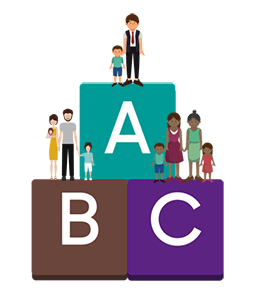You are here: Making childcare work for families
Where we are today
Childcare has improved dramatically over the past two decades, but it still doesn’t work for all families. Too many parents – and mums in particular – are frozen out of work by high childcare costs or poor availability. Too many children are missing out on the high quality early education that will boost their learning and helps to narrow the gap between disadvantaged children and their peers.

This General Election provides an opportunity for all political parties to set out an ambitious childcare strategy fit for the 21st century that tackles gender inequality and boosts social mobility. While recent investments are welcome, spending on childcare in the UK still lags behind other OECD countries: the UK currently spends 0.5 per cent of GDP on early childhood services compared to 0.7 to 1.1 per cent in the Nordic nations.
0.5%
1.1%
What we are calling for
01 - Make sure that every parent is better off working once they have paid for childcare
Making sure that every parent is better off working once they have paid for childcare will help parents to move out of poverty and into work. Currently, when a lone parent or a second earner moves into work or increases their hours, their rate of pay can be as low as £1.96 per hour after childcare costs have been paid. Some families, such as couple parents with two low earners and those with disabled children may not even see this modest gain. No family should have to pay to work.

1.96

116

About the data behind this
02 - Put early education on par with school education, making an early education place a legal entitlement
Early education matters – it gets children ready for school and sets them up for the rest of their lives. Despite recent funding increases, primary schools get nearly twice as much money per pupil as early education providers – despite early years providers offering roughly as many hours starting this year with the new 30 hour entitlement (IFS, 2017).
We need a funding settlement that recognises that education is just as important in the early years as it is for older children and guarantees a good quality education for all children, irrespective of how old they are or where they live in the country.

1700

4900

About the data behind this
03 - Extend 15 hours of free childcare per week to all two year olds
Currently all three and four years olds, but only the 40 per cent most deprived two year olds, are entitled to 15 hours of free childcare each week. This targeted approach can mean that a stigma becomes attached to provision causing some children to miss out, and can act as a work disincentive as a small increase in earnings could mean that a family is no longer eligible for a free place.
A universal approach where all two year olds were eligible for a place would help more children – including those who need it most – to benefit from early education and support parents to work.
04 - Make sure there is enough high quality childcare for every family that needs it, including school age children
Childcare availability is currently a postcode lottery: only half of local authorities have enough childcare for parents who work full time. The shortages are even more acute for disabled children and for children whose parents work non-typical hours such as shift workers, where less than one in five local authorities have enough childcare (Childcare Survey 2017).
Only high quality childcare boosts children’s outcomes but early years staff are among the lowest paid professional groups in the labour market: non-senior staff in private and voluntary daycare providers earn on average £8.00 per hour whilst senior managers earn £11.20 per hour (DfE Survey of providers, 2017).
The next government should introduce a Chief Early Years Officer who will represent early years professionals and work with government to improve the quality and availability of childcare.
20% of councils
£8.00

About the data behind this
05 - Make sure that no child with special educational needs or disabilities (SEND) is refused a childcare place
Children with SEND are less likely than other children to be able to take up their free early education place: only 41 per cent of surveyed parents of children with SEND were accessing the full 15 hours of early education, compared to 95 per cent of all children (Parliamentary inquiry into childcare for disabled children, 2014). Childcare settings can struggle to fund and provide the extra support needed to meet additional needs, meaning that parents might not be able to find a suitable childcare place.
The additional childcare funding for children with SEND is a welcome first step in starting to solve these issues. The next government needs to work with childcare providers to make sure that no child is turned away.
59% not accessing
5% not accessing




